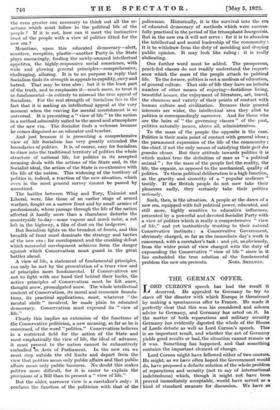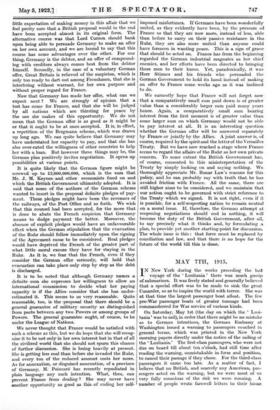THE GERMAN OFFER
LORD CURZON'S speech has had the result it deserved. He appealed to Germany to try to stave off the disaster with which Europe is threatened by making a spontaneous offer to France. He made it perfectly clear that this was his considered and solemn advice to Germany, and Germany has acted on it. In the matter of both reparations and military security Germany has evidently digested the whole of the House of Lords debate as well as Lord Curzon's speech. This is an important result, and whether the act of Germany yields good results or bad, the situation cannot remain as it was. Something has happened, and that something contains the important element of change.
Lord Curzon might have followed either of two courses. He might, as we have often hoped the Government would do, have proposed a definite solution of the whole problem of reparations and security (not to say of international indebtedness) which, though it might not have been proved immediately acceptable, would have served as a kind of standard measure for discussion. We have so little expectation of making money in this affair that we feel pretty sure that. a British proposal would in the end have been accepted almost in its original form. The alternative course was that Lord Curzon should bank upon being able to persuade Germany to make an offer on her own account, and we are bound to say that this course has some advantages over the other. For one thing„ Germany is the debtor, and an offer of compound- ing with creditors always comes best from the debtor himself. Secondly, in the case of a voluntary German offer, Great Britain is relieved of the suspicion, which is only too ready to dart out among Frenchmen, that she is interfering without warrant, for her own purpose and without proper regard for France.
Now that Germany has made her offer, what can we expect next ? We are strongly of opinion that a test has come for France, and that she will be. judged by all nations which are thirsting for peace by the use she makes of this opportunity. We do not mean that the German offer is as good as it might be or that it ought to be at once accepted. It is, in effect, a repetition of the Bergmann scheme, which was, drawn up long ago. We can quite believe that Germany may have understated her capacity to pay, and that she has also over-rated the willingness of other countries to help her with a loan. But however these things may be, the German plan positively invites negotiation. It opens, up possibilities at various, points.
It is quite- likely that, the German figure might be screwedr up , to. L2,000,000,000, which is the sum that Mr. J. M. Keynen.and. other economists fixed on and which the. British Government ultimately adopted.. It is said that some. of the authors of-:the German. scheme wanted to insert in the proposal definite pledges of pay- ment. These pledges might -have been' the revenues of the railways, of the. Post Office 'and so forth. We 'wish that this counsel. had been accepted, for the more that is done to abate the French suspicion that Germany means - to dodge payment - the better. Moreover, the absence. of explicit pledges would have an unfavourable effect when the German stipulation that the evacuation of the, Ruhr should .follow immediately upon the signing of the Agreement came to be considered. Real pledges would have deprived the French of the 'greater part of what little moral .excuse they have for staying. in the Ruhr. As it is,- we fear that the French, even if they consider. the, German . offer seriously, will hold that evacuation ran take place-only step by step as the debt is discharged.
It is to be noted that although Germany names a definite sum she expresses her, willingness to allow, an international' commission to decide what her paying capacity is if the Allies consider that she has, under- estimated it. This seems to us very reasonable. Quite reasonable,- too, is the ,proposal that there should be a general- guarantee of military security as distinguished from pacts between, any two Powers -or among groups of Powers. The general guarantee ought, of course, to. be under the League of Nations.
We never thought that France would be- satisfied with such a scheme as this, but we do hope that she will recog- nize it to be not onlyin her own interest but hi that of all the civilized world that she should not spurn this chance of further discussion. She is losing heavily at present She is getting less coal than before she invaded. the Ruhr, and every ton- of the reduced amount costs her more. As for annexation, or disguised annexation, of a province of Germany, M. Poincare has recently repudiated in plain' language any such intention. What, then, can prevent France. from dealing ? She may never have another opportunity so. good as this of ending her self- imposed misfortunes. If Germans have been wonderfully united, as they evidently have been, by the pressure of. France so that they are now more, instead of less, able than before to carry on their passive resistance in the-. Ruhr, they are also more united than anyone could have foreseen in wanting peace. This is a sign of grace that should be acted on. France has .from. the beginning regarded the German industrial magnates as. her chief enemies, and her efforts have been directed to bringing, these men to their knees. Yet, paradoxically, it was Herr Stinnes and his friends who persuaded the German Government to hold its hand instead of making an offer to France some weeks ago: as it was inclined to do.
We earnestly hope that France will not forget now. that a comparatively small sum paid 'down is of greater value than a considerably larger sum paid many years hence. Again, a comparatively small sum bearing interest from the first moment is -of greater value than' some larger sum on which :Germany would not be able to pay interest at all.. It is an interesting question whether the German offer will be. answered separately by France or jointly by the Allies. A joint answer is,, of course, required by the spiritand the letter of the Versailles Treaty. But we have now' reacheda stage where France • seems to regard the affairs of the Ruhr as her own private concern. To some extent the British Goverument has, of course,, consented to this misinterpretation of the Treaty by simply 'looking, on and saying nothing. We thoroughly appreciate Mr. Boner Law's reasons for this policy, and ,he can. probably .say with truth that. he has avoided friction with France: All the- same,, there are still higher aims to be considered, and we 'maintain that our action .ought to. be governed with 'strict reference .to the Treaty which we signed.. It -is not right, even if it is possible, for. a self-respecting nation to remain neutral on a moral issue. If, therefore,- the German attempt at. reopening negotiations should end in nothing, it will become. the duty of the British Government, after, all, to say precisely what it thinks and, by formulating a plan, to provide yet another starting-point for discussion. The whole issue is 'this: that force must be replaced by conciliation and law, and that there is no hope for the future of the world till this is: done:















































 Previous page
Previous page